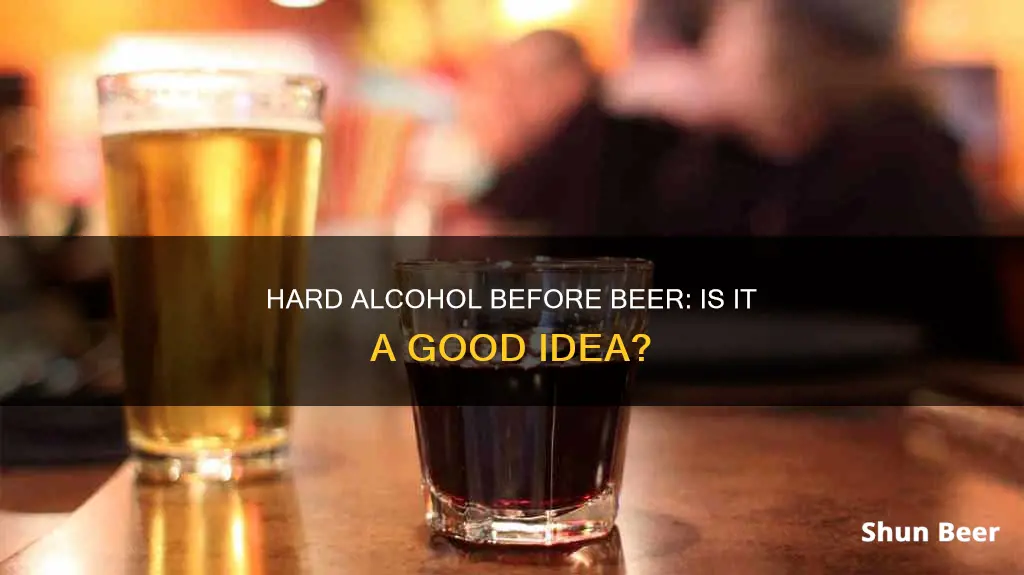
There are many theories and beliefs about the order in which alcoholic drinks should be consumed to avoid a hangover. One common saying is beer before liquor, never been sicker; liquor before beer, you're in the clear, suggesting that drinking beer before hard liquor will result in a worse hangover. However, there is little scientific evidence to support this claim. Studies have shown that the order of drinks has minimal impact on hangover severity, and that the total amount of alcohol consumed is a more critical factor. Other factors influencing hangovers include drinking on an empty stomach, smoking, genetics, and the frequency of drinking. While the order of drinks may not significantly affect hangovers, pacing and moderation are essential to avoiding adverse effects.
| Characteristics | Values |
|---|---|
| Effect on hangover severity | The order of drinks has no effect on hangover severity. |
| Effect on blood alcohol levels | Drinking hard liquor first may cause a quicker spike in blood alcohol levels. |
| Effect on drinking pace | Drinking beer first may help you pace yourself better. |
| Effect on intoxication | The amount of alcohol matters more than the type of drink. |
| Effect on absorption rate | Carbonated drinks may increase the rate of alcohol absorption. |
What You'll Learn

Hangover severity is not influenced by the order of drinks
The popular saying goes, "beer before liquor, never been sicker; liquor before beer, you're in the clear." This saying refers to the belief that the order in which you consume alcoholic beverages can help you avoid a hangover. However, despite the elaborate theories and long-held beliefs, the order of drinks does not seem to influence hangover severity.
The idea that drinking beer before liquor can lead to worse hangovers is based on a few assumptions. One is that most people start their evenings with drinks that have a lower alcohol content, such as beer, and then move on to harder liquor as the night progresses. If they end up with a hangover or feel unwell, they may attribute it to the order in which they consumed their drinks. Another theory suggests that liquor's high alcohol content can quickly spike your blood alcohol levels compared to beer. Therefore, finishing the night with liquor after drinking beer can push your blood alcohol content over the edge, contributing to a more severe hangover.
However, the truth is that alcohol begins to be absorbed into your bloodstream as soon as it reaches your stomach. So, regardless of the order in which you drink beer and liquor, all the alcohol will have been absorbed before your hangover takes effect. As long as the total amount of alcohol consumed remains the same, there is no evidence to suggest that drinking liquor before beer will protect against a hangover any more than drinking beer before liquor.
A 2019 study published in the American Journal of Clinical Nutrition tested this theory by dividing 90 people into three groups. One group consumed beer followed by wine, the second group consumed the same drinks in the opposite order, and the third group drank only beer or only wine, with matching alcohol levels. The study found that changing the order of the drinks made little to no difference in the severity of hangovers experienced by the participants.
While the order of drinks may not influence hangover severity, other factors certainly do. These include the total amount of alcohol consumed, whether you drank on an empty stomach, how frequently you drink, genetics, congeners (compounds found in alcoholic beverages that can contribute to hangovers), and smoking status.
Drinking Beer on Mississippi Streets: What's the Law?
You may want to see also

Drinking beer first may lead to overconsumption of liquor
Starting with beer can also lead to drinking more liquor than intended. As beer takes longer to consume, it is easier to pace yourself and evaluate how you are feeling. When starting with liquor, decision-making can become compromised, and it may be more challenging to pace yourself and avoid overconsumption.
Additionally, the carbonation in beer and sparkling drinks can temporarily increase alcohol absorption. The carbon dioxide agitates the lining of the small intestine, pushing alcohol into the bloodstream faster. While this may not necessarily lead to a hangover, it can contribute to a higher level of intoxication.
Therefore, drinking beer first may lead to a faster onset of drunkenness and make it more challenging to pace yourself, potentially resulting in overconsumption of liquor.
Beer and Invisalign: What You Should Know
You may want to see also

Liquor first may be better as beer drinking tends to slow down later
There are many theories and beliefs about whether to drink beer or liquor first to avoid a hangover. The popular saying goes, "beer before liquor, never been sicker; liquor before beer, you're in the clear." This implies that drinking liquor first may be better as beer drinking tends to slow down later in the night.
The idea behind this saying is that starting with liquor and moving to beer can help prevent excessive drunkenness or vomiting. Liquor has a higher alcohol content, so starting with it may lead to a faster spike in blood alcohol levels. However, following liquor with beer may slow down the rate of alcohol consumption and give the body more time to process the alcohol.
Additionally, the volume of drinks and the time taken to consume them are important factors. A beer tends to take longer to drink than a cocktail or a shot due to its larger volume. Therefore, drinking beer first may result in a lower alcohol consumption rate per minute compared to starting with cocktails. Starting with liquor allows you to consume heavier drinks at the beginning of the night when you are more sober and better able to pace yourself.
Furthermore, the carbonation in beer and sparkling drinks can temporarily increase alcohol absorption. The carbon dioxide can agitate the lining of the small intestine, pushing alcohol into the bloodstream faster. However, this effect is not significant enough to cause a hangover.
While the order of drinks may not have a substantial impact on hangovers, other factors do. These include the total amount of alcohol consumed, drinking on an empty stomach, frequency of drinking, genetics, and congeners in drinks. Ultimately, to reduce the risk of a hangover, it is essential to drink in moderation, stay hydrated, and be mindful of individual health factors.
Beer Drinking: A Slave's Historical Perspective
You may want to see also

Carbonation in beer may increase alcohol absorption
However, it's important to note that carbonation is not the only factor that affects alcohol absorption. Other factors include existing medications, health conditions, smoking, and body composition. Additionally, drinking on an empty stomach, high alcohol content, drinking speed, gender, mood, food in the stomach, tolerance to alcohol, physical condition, and altitude can all impact how quickly alcohol is absorbed and how intoxicated a person becomes.
While carbonation may increase the rate of alcohol absorption, it does not make a person more drunk overall. The amount of alcohol consumed and the time over which it is consumed are the most important factors in determining intoxication and the severity of a hangover.
The belief that drinking beer before liquor can be avoided to prevent a hangover is a common misconception. The order in which drinks are consumed does not affect the severity of a hangover, as alcohol is absorbed into the bloodstream as soon as it reaches the stomach. Therefore, all the alcohol consumed will have been absorbed before a hangover occurs.
Low-Carb Beer and Keto: What's the Verdict?
You may want to see also

Total alcohol consumption matters more than the order of drinks
The popular saying goes, "Beer before liquor, never been sicker; liquor before beer, you're in the clear." This saying refers to the belief that the order in which you consume alcoholic beverages can influence the severity of your hangover. However, this notion has been debunked by scientific research, which suggests that total alcohol consumption matters more than the order of drinks.
The idea that drinking beer before liquor can lead to a worse hangover is based on the assumption that starting with a "softer" drink like beer and then switching to harder liquor can cause drunkenness to come on too fast, resulting in vomiting or a severe hangover. On the other hand, starting with liquor and then slowing down with beer is thought to prevent these negative consequences.
However, the alcohol consumer education group AlcoRehab asserts that the amount of alcohol you consume and the time over which you drink it are more significant factors in determining the severity of a hangover than the type of drinks or the order in which you consume them. Drinking too much alcohol, regardless of the type, can lead to negative consequences such as drunkenness, vomiting, or a hangover.
This conclusion is supported by a 2019 study published in the American Journal of Clinical Nutrition. The study found that changing the order of drinks had little to no impact on the severity of hangovers experienced by participants. Similarly, sticking to one type of drink did not make hangovers more bearable. The study concluded that neither the type nor the order of alcoholic beverages affected hangover intensity.
Another factor to consider is how well your body absorbs alcohol in different forms. A 2007 study found that diluted vodka was absorbed faster than vodka served neat. This suggests that even if the same amount of time is taken to consume straight liquor or a glass of wine (which contain similar amounts of alcohol), the wine may lead to greater intoxication due to better absorption into the bloodstream.
In conclusion, while the order of drinks may have some influence on the absorption rate of alcohol, the total amount of alcohol consumed remains the most critical factor in determining the severity of a hangover. Pacing your drinking and moderating your overall alcohol intake are more effective strategies for avoiding negative consequences than relying on specific drink orders.
Beer Drinking in Public: North Carolina's Law
You may want to see also
Frequently asked questions
It is a common misconception that drinking hard liquor before beer will help you avoid a hangover. The truth is that the order in which you consume your drinks is unlikely to influence whether you experience a hangover the next day. What matters is the total amount of alcohol consumed and how quickly you drink it.
Alcohol begins to be absorbed into your bloodstream as soon as it reaches your stomach. Therefore, all the alcohol you drank the night before will have been absorbed long before your hangover takes effect. As long as the total amount of alcohol you consume remains the same, drinking hard liquor before beer will not protect you from a hangover.
Other factors that can influence the likelihood of a hangover include the amount of alcohol consumed, whether you ate before drinking, how frequently you drink, genetics, congeners (compounds found in alcoholic beverages that can contribute to hangovers), and smoking.







